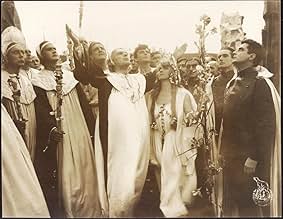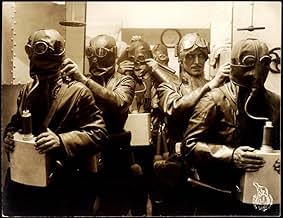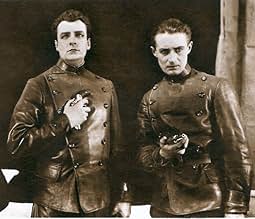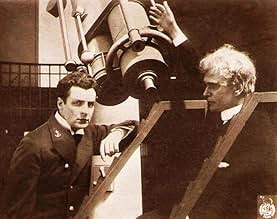A group of researchers from Earth travel in a spaceship to Mars, where, to big surprise, they find a peaceful vegetarian and pacifist civilization.A group of researchers from Earth travel in a spaceship to Mars, where, to big surprise, they find a peaceful vegetarian and pacifist civilization.A group of researchers from Earth travel in a spaceship to Mars, where, to big surprise, they find a peaceful vegetarian and pacifist civilization.
- Director
- Writers
- Stars
Nils Asther
- Wounded Martian Citizen
- (uncredited)
Alfred Osmund
- Martian Priest
- (uncredited)
- Director
- Writers
- All cast & crew
- Production, box office & more at IMDbPro
6.4898
1
2
3
4
5
6
7
8
9
10
Featured reviews
The First Space Opera and First Sci-Fi Feature Film
Years before the movie serial Flash Gordon came upon the scene, the first science-fiction space opera was Denmark's February 1918 "A Trip To Mars." Produced during the middle of World War One, the movie paints a utopian vision of peace & love on the planet Mars from its inhabitants. The line "Love is the Force you call God" is repeated several times, illustrating how screenwriter Ole Olsen felt Earthlings needed to be reminded of that lesson while the European carnage was happening next door to Denmark.
It has been noted "A Trip To Mars" is the first science fiction feature-length movie ever produced. There have been earlier alien-encounter films on Mars and the Moon released, but they were "shorts." The Mars journey the Danes created here was made at a time when lines thought to be canals existing on the planet could be seen from our best telescopes, hinting there was a sophisticated alien life there. When the movie's Earthlings land on the very hospitable planet, its residents welcome their visitors with open arms--that is until a gun is produce by one of the "barbaric" guests to shoot down a bird, setting off a contrast between the two civilizations.
Once things are set right, the viewer appreciates the love and kindness of the Martians, one of the very few times the Red Planet is shown to have benevolent aliens (See list of top Mars movies ranked in below links). Just as the real life Pocahontas was brought to England to showcase the Native Americans, Mars' knockout female Corona was transported to Earth to convey a heavenly message of peace, love and understanding.
A portion of "A Trip To Mars" is devoted to the technology of transporting men to another planet. Many inventions and scientific research have gone towards present-day's outer space achievements, but the fact the film devotes its time towards space travel qualifies it as a "space opera," a phrase coined in 1941. Like soap operas, space operas have dramatic impact on not only the method of travel, but the dramatics of human encounters with alien life. In "A Trip To Mars," the movie's aim is to impact its audience with a message that was hoped to change the direction of Western civilization, just as Thomas More had intended in his book "Utopia" and James Hilton in his "Shangri-La." With "The War To End All Wars" becoming just one in a string of long bloody conflicts following it, the Martian example hasn't quite sunk in yet.
It has been noted "A Trip To Mars" is the first science fiction feature-length movie ever produced. There have been earlier alien-encounter films on Mars and the Moon released, but they were "shorts." The Mars journey the Danes created here was made at a time when lines thought to be canals existing on the planet could be seen from our best telescopes, hinting there was a sophisticated alien life there. When the movie's Earthlings land on the very hospitable planet, its residents welcome their visitors with open arms--that is until a gun is produce by one of the "barbaric" guests to shoot down a bird, setting off a contrast between the two civilizations.
Once things are set right, the viewer appreciates the love and kindness of the Martians, one of the very few times the Red Planet is shown to have benevolent aliens (See list of top Mars movies ranked in below links). Just as the real life Pocahontas was brought to England to showcase the Native Americans, Mars' knockout female Corona was transported to Earth to convey a heavenly message of peace, love and understanding.
A portion of "A Trip To Mars" is devoted to the technology of transporting men to another planet. Many inventions and scientific research have gone towards present-day's outer space achievements, but the fact the film devotes its time towards space travel qualifies it as a "space opera," a phrase coined in 1941. Like soap operas, space operas have dramatic impact on not only the method of travel, but the dramatics of human encounters with alien life. In "A Trip To Mars," the movie's aim is to impact its audience with a message that was hoped to change the direction of Western civilization, just as Thomas More had intended in his book "Utopia" and James Hilton in his "Shangri-La." With "The War To End All Wars" becoming just one in a string of long bloody conflicts following it, the Martian example hasn't quite sunk in yet.
An intelligent (though dated) comment on the world.
The view of the world in this movie is clearly dated, but as the movie is from 1918, it's hard to put it against it. What is more impressive is everything it does right. This is not a movie using science fiction as a gimmick - it uses the genre to explore ideas about the time it was made. In the end of the first world war, here's a movie exploring if mankind can live in peace, how we treat our prisoners, how life in a submarine (here: spacecraft) can affect ones mental health, how pushing science forward is a global affair, and can unite different parts of the world, and so on.
While I am not sure just how much the general public knew about astronomy - this movie presents the mission to mars in a way that seems realistic. It takes time, people doubt it, and it takes a toll on the members. They point out where mars will be as they leave Earth, and where it will be when they arrive. The spacecraft itself is like a submarine with a propeller and wings. Mars itself I am sure was quite a mystery back then, so the fact that they made it Earth-like is very understandable. It also opened up for them using Mars and Martians in a way that let the film makers comment on the people of Earth.
The movie is not subtle in the message it is conveying: people on earth should stop with wars and violence and rather go with love. In the end of the most gruesome war in world history up till that point - that sounds like a good message.
The worst part about this movie is the one evil character in it. He serves little purpose, and undermines the underlying message of the film that humans are capable of being good.
While I am not sure just how much the general public knew about astronomy - this movie presents the mission to mars in a way that seems realistic. It takes time, people doubt it, and it takes a toll on the members. They point out where mars will be as they leave Earth, and where it will be when they arrive. The spacecraft itself is like a submarine with a propeller and wings. Mars itself I am sure was quite a mystery back then, so the fact that they made it Earth-like is very understandable. It also opened up for them using Mars and Martians in a way that let the film makers comment on the people of Earth.
The movie is not subtle in the message it is conveying: people on earth should stop with wars and violence and rather go with love. In the end of the most gruesome war in world history up till that point - that sounds like a good message.
The worst part about this movie is the one evil character in it. He serves little purpose, and undermines the underlying message of the film that humans are capable of being good.
Filmed on location!
Sci-fi is a rapidly changing genre. It loses impact even more rapidly than horror. Therefore it's virtually impossible to see a sci-fi movie from the past (from the pre-space period, i.e. late 50s) that isn't laughable in some sense. First serious sci-fi epics appeared in the very early 50s, and bearing in mind the first space yarn was filmed by Melies in 1902, we get about 50 years of sci-fi without the very basic concepts of space travel. Where The Trip To The Moon can be dismissed as a funny experiment, The Trip To Mars cannot. This is a serious film. The makers didn't know about weightlessness or the absence of atmosphere in space, plus about a hundred more things we know today. That was the period, when everybody was raving about the channels on Mars, so they naturally assumed there was intelligent life on that planet. Melies shows frogmen and other strange creatures on the Moon; in 1924 there appears the still popular tinfoil dress for Martians in Russian film Aelita. So, in between, we get the Egypto-Greek fairy-tale world of this film: wise old priests being wise; and virgins prancing around, praising virtue in the world, where virtue obviously is as normal and unnoticeable as metabolism. Enter the Earthlings, introducing death and sin. Well, nothing spectacular follows: they soon are "cured" and learn the ways of the righteous. This film is a total orgy of enjoyment. The double feature released by the Danish Film Institute (together with a disaster film from 1916, The End Of The World) boosts their usual superior quality. The Danes began storing and archiving their films very early, so you get a very clean second generation copy from a period when most of US films withdrawn from circulation went to the glue or comb factory. It's a pity this film with so many different locations isn't color tinted. The rather uninspired piano accompaniment, another trade mark of the series from the DFI, tends to grow a bit tedious too. But nevertheless, a remarkable film and something you can show to your friends without being afraid that they'll think you're a weirdo.
Himmelskibet is available again
I saw this film from 1918 recently at our local Helsinkian film archive. It seems that the Danish Film Institute has reconstructed it in 2006 to celebrate the 100th anniversary of Nordisk filmcompany, which was one of the largest in the world in the early 20th century. I believe there are several copies with English translations circulating around Europe at the moment.
I found the film fascinating and the trip to Mars well thought out. The plot line is certainly original, but I really don't want to reveal any more of it at the moment, as now the danger of spoiling things for you really exists ;-).
The film is also available on DVD, query the Danish Film Institute (Det Danske Filminstitut) web pages at dfi.dk with 'Himmelskibet' to get more info.
I found the film fascinating and the trip to Mars well thought out. The plot line is certainly original, but I really don't want to reveal any more of it at the moment, as now the danger of spoiling things for you really exists ;-).
The film is also available on DVD, query the Danish Film Institute (Det Danske Filminstitut) web pages at dfi.dk with 'Himmelskibet' to get more info.
green-cheese Danish
I saw "Heaven-Ship" ("Himmelskibet") at the 2006 Cinema Muto festival in Sacile, Italy. What a great movie! This Danish steampunk saga is the stirring tale of the first trip to Mars, in an era when wireless telegraphy hasn't been perfected. The spaceship hasn't got a radio, and the heroes are brought back from the landing field via horsecart. Even the intertitles are delightful ... some of them written in rhymed couplets in the original Danish.
The actors' performances are laughable, largely hand-to-brow histrionics. But the sets are astonishing, easily surpassing anything done by Georges Melies a decade earlier (or in "Die Frau im Mond" a decade later). Of course, the plot is simplistic. The spaceship's crew consist of seven thin guys and one fat slob. Guess which one cracks. Interestingly, everyone in this movie (except the dubious Professor Dubius) ardently believes in God. Even the Martians.
Impressively, the scenarists have the sense to acknowledge that a trip to Mars is no doddle: the title cards establish that it takes the scientists two years to build their spaceship (which has an airscrew) and six months to reach Mars. During the construction sequence, there's one extremely impressive set-up which must have been choreographed: dozens of workers all hustle through the worksite in different directions, with no hesitations and no collisions. The Danish scientists christen their ship "Excelsior" ("packing materials"?) and set course for Mars, even though the Moon and Venus are closer. When the ship (which flies horizontally, not vertically) lands on Mars, it is greeted by "Marsboerne" -- Martians -- who turn out to be Nordic blondes, all highly-developed pacifists and vegetarians. (As a highly-developed meat-eater, I resented that part.)
Conveniently enough, Mars turns out to have an atmosphere just like Earth's, as well as equal gravity. In an exterior shot of the Martian landscape, the Sun's apparent magnitude when seen from Mars is the same as it is when viewed from Earth. I also couldn't help observing that all the wise elder Martians are male. In fact, female elders are thin on the ground here: both the Earth-born hero and the Martian maiden are motherless. The Martians speak a universal language, wear ankhs on their robes, and greet the Earth visitors with a globe of Earth ... which of course they hold with its North Pole upward.
That Martian maiden is Marya, played by an ethereally beautiful Danish actress. (Waiter, I'll have some of that Danish!) We see a Martian dance of chastity which might have been twee or ludicrous but is actually quite touching and beautiful. Also, the Martian funeral scene features one shot which reminded me of a sequence in "The Seventh Seal". I wonder if Ingmar Bergman saw this film.
"Himmelskibet" has a few flaws, but its production design and its other merits very far outweigh its drawbacks. The Ole Olsen who is named in the credits (and who appears in a brief prologue) is no relation to Chic Johnson's vaudeville partner from "Hellzapoppin". I would give "Himmelskibet" a 12, but the scale tops off at 10 ... so, a full 10 out of 10 for this delightful trip to Mars, the blonde planet!
The actors' performances are laughable, largely hand-to-brow histrionics. But the sets are astonishing, easily surpassing anything done by Georges Melies a decade earlier (or in "Die Frau im Mond" a decade later). Of course, the plot is simplistic. The spaceship's crew consist of seven thin guys and one fat slob. Guess which one cracks. Interestingly, everyone in this movie (except the dubious Professor Dubius) ardently believes in God. Even the Martians.
Impressively, the scenarists have the sense to acknowledge that a trip to Mars is no doddle: the title cards establish that it takes the scientists two years to build their spaceship (which has an airscrew) and six months to reach Mars. During the construction sequence, there's one extremely impressive set-up which must have been choreographed: dozens of workers all hustle through the worksite in different directions, with no hesitations and no collisions. The Danish scientists christen their ship "Excelsior" ("packing materials"?) and set course for Mars, even though the Moon and Venus are closer. When the ship (which flies horizontally, not vertically) lands on Mars, it is greeted by "Marsboerne" -- Martians -- who turn out to be Nordic blondes, all highly-developed pacifists and vegetarians. (As a highly-developed meat-eater, I resented that part.)
Conveniently enough, Mars turns out to have an atmosphere just like Earth's, as well as equal gravity. In an exterior shot of the Martian landscape, the Sun's apparent magnitude when seen from Mars is the same as it is when viewed from Earth. I also couldn't help observing that all the wise elder Martians are male. In fact, female elders are thin on the ground here: both the Earth-born hero and the Martian maiden are motherless. The Martians speak a universal language, wear ankhs on their robes, and greet the Earth visitors with a globe of Earth ... which of course they hold with its North Pole upward.
That Martian maiden is Marya, played by an ethereally beautiful Danish actress. (Waiter, I'll have some of that Danish!) We see a Martian dance of chastity which might have been twee or ludicrous but is actually quite touching and beautiful. Also, the Martian funeral scene features one shot which reminded me of a sequence in "The Seventh Seal". I wonder if Ingmar Bergman saw this film.
"Himmelskibet" has a few flaws, but its production design and its other merits very far outweigh its drawbacks. The Ole Olsen who is named in the credits (and who appears in a brief prologue) is no relation to Chic Johnson's vaudeville partner from "Hellzapoppin". I would give "Himmelskibet" a 12, but the scale tops off at 10 ... so, a full 10 out of 10 for this delightful trip to Mars, the blonde planet!
Did you know
- TriviaReported by the British press in 1919 to have cost £20,000. After inflation this would be approaching £1.5 million in 2024.
- Quotes
Avanti Planetaros - Captain of the Space Ship: Glowing and calling planets... I am coming!
Details
- Release date
- Country of origin
- Official site
- Language
- Also known as
- Nebeska ladja
- Production company
- See more company credits at IMDbPro
- Runtime
- 1h 37m(97 min)
- Color
- Sound mix
- Aspect ratio
- 1.33 : 1
Contribute to this page
Suggest an edit or add missing content






























